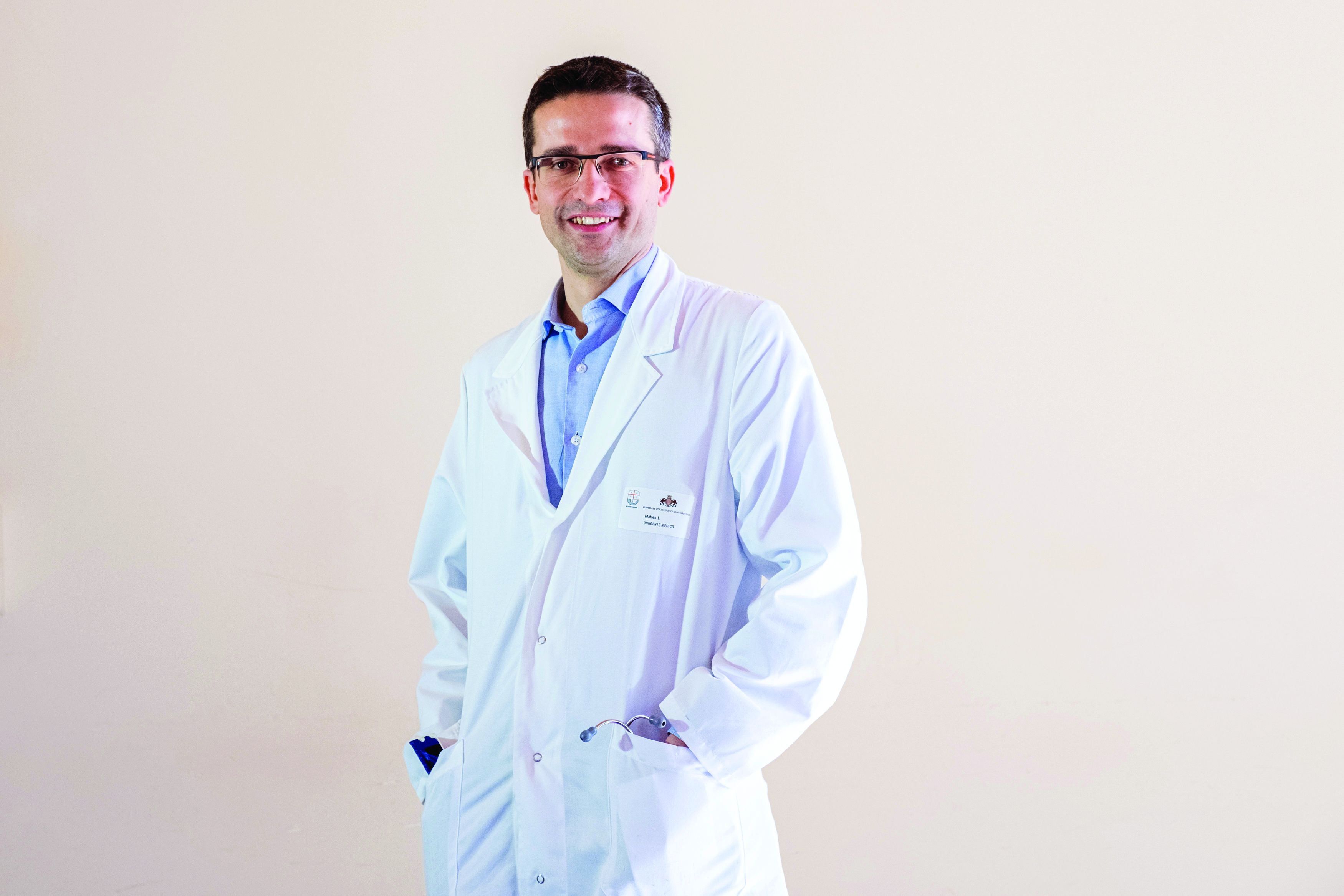User login
Breast cancer survivors are less likely to get pregnant and have higher risks of some delivery and fetal complications, according to a meta-analysis reported at the 2020 San Antonio Breast Cancer Symposium.
However, the data also showed that pregnancy does not increase the risk of cancer recurrence.
“With the availability of more effective anticancer treatments, survivorship and addressing the treatments’ potential long-term toxicities has gained substantial attention,” said study investigator Matteo Lambertini, MD, PhD, of University of Genova (Italy) – IRCCS Policlinico San Martino Hospital.
“Returning to a normal life after cancer diagnosis and treatment should be considered, in the 21st century, as a crucial ambition in cancer care,” Dr. Lambertini added. “In patients diagnosed during their reproductive years, this includes the possibility to complete their family planning. Due to the constant rise in age at first pregnancy over the past years, many women are diagnosed with breast cancer before completing their reproductive plans.”
In that context, certain cancer treatments have the potential to reduce fertility. In addition, many women need prolonged hormone therapy, and conception is contraindicated while they are receiving it.
Study results
Dr. Lambertini and colleagues performed a meta-analysis using data from 39 studies that included a total of 114,573 breast cancer patients and 8,093,401 women from the general population.
Results showed that breast cancer survivors were much less likely than women in the general population to become pregnant (relative risk, 0.40; P < .001).
However, “the majority of the studies included in our meta-analysis did not capture the information on how many women tried to get pregnant,” Dr. Lambertini cautioned.
In the few studies that did, more than half of women trying to conceive did become pregnant, and most of them were able to do so naturally, without need for assisted reproductive technologies.
On the flip side, analyses also showed that pregnancies occurred in some women who did not want to conceive, underscoring the importance of comprehensive oncofertility counseling that addresses not only fertility preservation, but also contraception, Dr. Lambertini said.
Among women who became pregnant, breast cancer survivors did not have higher odds of spontaneous abortion or complications such as preeclampsia, and their infants were not significantly more likely to have congenital abnormalities.
However, the breast cancer survivor group did have higher odds of cesarean birth (odds ratio, 1.14; P = .007), low birth weight (OR, 1.50; P < .001), preterm birth (OR, 1.45; P = .006), and infants small for gestational age (OR, 1.16; P = .039).
In stratified analysis, the higher risk of having an infant with low birth weight was significant only for women who had received chemotherapy, and the higher risk of having an infant small for gestational age was significant only for women who had received chemotherapy or who had a late pregnancy (more than 2 years to 5 years after cancer diagnosis).
Among breast cancer survivors, those who became pregnant actually had lower risks of disease-free survival events (hazard ratio, 0.73; P = .016) and death (HR, 0.56; P < .001). Findings were similar in the subset of studies that adjusted for the so-called healthy mother effect.
Pregnancy did not significantly affect disease-free survival among women with hormone receptor–positive disease and appeared protective among women with hormone receptor–negative disease (HR, 0.72).
Pregnancy also appeared safe in terms of overall survival, irrespective of survivors’ BRCA status, nodal status, receipt of chemotherapy, pregnancy outcome (completed vs. abortion), and pregnancy interval.
This study was limited by the lack of patient-level data and by the fact that most of the included studies had a retrospective design, Dr. Lambertini acknowledged.
Close monitoring, early discussions are key
“Results of this meta-analysis provide reassuring, updated evidence on the feasibility and safety of conceiving in young women with prior breast cancer diagnosis. They provide crucial information for improving the oncofertility counseling of young breast cancer patients, helping them and their treating physicians in making evidence-based decisions on future family planning,” Dr. Lambertini commented.
“The higher risk of delivery and fetal complications … calls for ensuring a closer monitoring of these pregnancies,” he added. “The lack of detrimental prognostic effect of pregnancy after breast cancer following appropriate treatment and follow-up strongly voices the need for a deeper consideration of patients’ pregnancy desire as a crucial component of their survivorship care plan and wish to return to a normal life.”
“The findings provide further support regarding the safety of pregnancy following a breast cancer diagnosis,” agreed Halle Moore, MD, of Cleveland Clinic Taussig Cancer Institute in Ohio, who was not involved in this study.
“I would add that we still have a lot to learn about optimal timing of pregnancy with respect to breast cancer treatment for women with hormone-sensitive breast cancer treated with endocrine therapy,” she said.
The study’s results serve as a reminder that providers should be routinely discussing future pregnancy wishes and fertility preservation options with breast cancer patients at the time of initial diagnosis, Dr. Moore said.
“The earlier we identify an interest in future fertility, the more we can do to improve the chances for a successful pregnancy outcome,” she elaborated. “It is important to assess interest in future pregnancy as soon as possible when a young woman is diagnosed with breast cancer, as fertility preservation options are most likely to be successful when applied prior to chemotherapy or hormonal treatment for breast cancer.”
“The findings also suggest that involvement of a high-risk obstetrics team should be considered for pregnant breast cancer survivors,” Dr. Moore noted.
This research was funded by the Italian Ministry of Health and the Italian Association for Cancer Research. Dr. Lambertini and Dr. Moore disclosed no conflicts of interest. Eva Blondeaux, MD, of University of Genova – IRCCS Policlinico San Martino Hospital, who presented this research at the meeting, disclosed no conflicts as well.
SOURCE: Blondeaux e et al. SABCS 2020, Abstract GS3-09.
Breast cancer survivors are less likely to get pregnant and have higher risks of some delivery and fetal complications, according to a meta-analysis reported at the 2020 San Antonio Breast Cancer Symposium.
However, the data also showed that pregnancy does not increase the risk of cancer recurrence.
“With the availability of more effective anticancer treatments, survivorship and addressing the treatments’ potential long-term toxicities has gained substantial attention,” said study investigator Matteo Lambertini, MD, PhD, of University of Genova (Italy) – IRCCS Policlinico San Martino Hospital.
“Returning to a normal life after cancer diagnosis and treatment should be considered, in the 21st century, as a crucial ambition in cancer care,” Dr. Lambertini added. “In patients diagnosed during their reproductive years, this includes the possibility to complete their family planning. Due to the constant rise in age at first pregnancy over the past years, many women are diagnosed with breast cancer before completing their reproductive plans.”
In that context, certain cancer treatments have the potential to reduce fertility. In addition, many women need prolonged hormone therapy, and conception is contraindicated while they are receiving it.
Study results
Dr. Lambertini and colleagues performed a meta-analysis using data from 39 studies that included a total of 114,573 breast cancer patients and 8,093,401 women from the general population.
Results showed that breast cancer survivors were much less likely than women in the general population to become pregnant (relative risk, 0.40; P < .001).
However, “the majority of the studies included in our meta-analysis did not capture the information on how many women tried to get pregnant,” Dr. Lambertini cautioned.
In the few studies that did, more than half of women trying to conceive did become pregnant, and most of them were able to do so naturally, without need for assisted reproductive technologies.
On the flip side, analyses also showed that pregnancies occurred in some women who did not want to conceive, underscoring the importance of comprehensive oncofertility counseling that addresses not only fertility preservation, but also contraception, Dr. Lambertini said.
Among women who became pregnant, breast cancer survivors did not have higher odds of spontaneous abortion or complications such as preeclampsia, and their infants were not significantly more likely to have congenital abnormalities.
However, the breast cancer survivor group did have higher odds of cesarean birth (odds ratio, 1.14; P = .007), low birth weight (OR, 1.50; P < .001), preterm birth (OR, 1.45; P = .006), and infants small for gestational age (OR, 1.16; P = .039).
In stratified analysis, the higher risk of having an infant with low birth weight was significant only for women who had received chemotherapy, and the higher risk of having an infant small for gestational age was significant only for women who had received chemotherapy or who had a late pregnancy (more than 2 years to 5 years after cancer diagnosis).
Among breast cancer survivors, those who became pregnant actually had lower risks of disease-free survival events (hazard ratio, 0.73; P = .016) and death (HR, 0.56; P < .001). Findings were similar in the subset of studies that adjusted for the so-called healthy mother effect.
Pregnancy did not significantly affect disease-free survival among women with hormone receptor–positive disease and appeared protective among women with hormone receptor–negative disease (HR, 0.72).
Pregnancy also appeared safe in terms of overall survival, irrespective of survivors’ BRCA status, nodal status, receipt of chemotherapy, pregnancy outcome (completed vs. abortion), and pregnancy interval.
This study was limited by the lack of patient-level data and by the fact that most of the included studies had a retrospective design, Dr. Lambertini acknowledged.
Close monitoring, early discussions are key
“Results of this meta-analysis provide reassuring, updated evidence on the feasibility and safety of conceiving in young women with prior breast cancer diagnosis. They provide crucial information for improving the oncofertility counseling of young breast cancer patients, helping them and their treating physicians in making evidence-based decisions on future family planning,” Dr. Lambertini commented.
“The higher risk of delivery and fetal complications … calls for ensuring a closer monitoring of these pregnancies,” he added. “The lack of detrimental prognostic effect of pregnancy after breast cancer following appropriate treatment and follow-up strongly voices the need for a deeper consideration of patients’ pregnancy desire as a crucial component of their survivorship care plan and wish to return to a normal life.”
“The findings provide further support regarding the safety of pregnancy following a breast cancer diagnosis,” agreed Halle Moore, MD, of Cleveland Clinic Taussig Cancer Institute in Ohio, who was not involved in this study.
“I would add that we still have a lot to learn about optimal timing of pregnancy with respect to breast cancer treatment for women with hormone-sensitive breast cancer treated with endocrine therapy,” she said.
The study’s results serve as a reminder that providers should be routinely discussing future pregnancy wishes and fertility preservation options with breast cancer patients at the time of initial diagnosis, Dr. Moore said.
“The earlier we identify an interest in future fertility, the more we can do to improve the chances for a successful pregnancy outcome,” she elaborated. “It is important to assess interest in future pregnancy as soon as possible when a young woman is diagnosed with breast cancer, as fertility preservation options are most likely to be successful when applied prior to chemotherapy or hormonal treatment for breast cancer.”
“The findings also suggest that involvement of a high-risk obstetrics team should be considered for pregnant breast cancer survivors,” Dr. Moore noted.
This research was funded by the Italian Ministry of Health and the Italian Association for Cancer Research. Dr. Lambertini and Dr. Moore disclosed no conflicts of interest. Eva Blondeaux, MD, of University of Genova – IRCCS Policlinico San Martino Hospital, who presented this research at the meeting, disclosed no conflicts as well.
SOURCE: Blondeaux e et al. SABCS 2020, Abstract GS3-09.
Breast cancer survivors are less likely to get pregnant and have higher risks of some delivery and fetal complications, according to a meta-analysis reported at the 2020 San Antonio Breast Cancer Symposium.
However, the data also showed that pregnancy does not increase the risk of cancer recurrence.
“With the availability of more effective anticancer treatments, survivorship and addressing the treatments’ potential long-term toxicities has gained substantial attention,” said study investigator Matteo Lambertini, MD, PhD, of University of Genova (Italy) – IRCCS Policlinico San Martino Hospital.
“Returning to a normal life after cancer diagnosis and treatment should be considered, in the 21st century, as a crucial ambition in cancer care,” Dr. Lambertini added. “In patients diagnosed during their reproductive years, this includes the possibility to complete their family planning. Due to the constant rise in age at first pregnancy over the past years, many women are diagnosed with breast cancer before completing their reproductive plans.”
In that context, certain cancer treatments have the potential to reduce fertility. In addition, many women need prolonged hormone therapy, and conception is contraindicated while they are receiving it.
Study results
Dr. Lambertini and colleagues performed a meta-analysis using data from 39 studies that included a total of 114,573 breast cancer patients and 8,093,401 women from the general population.
Results showed that breast cancer survivors were much less likely than women in the general population to become pregnant (relative risk, 0.40; P < .001).
However, “the majority of the studies included in our meta-analysis did not capture the information on how many women tried to get pregnant,” Dr. Lambertini cautioned.
In the few studies that did, more than half of women trying to conceive did become pregnant, and most of them were able to do so naturally, without need for assisted reproductive technologies.
On the flip side, analyses also showed that pregnancies occurred in some women who did not want to conceive, underscoring the importance of comprehensive oncofertility counseling that addresses not only fertility preservation, but also contraception, Dr. Lambertini said.
Among women who became pregnant, breast cancer survivors did not have higher odds of spontaneous abortion or complications such as preeclampsia, and their infants were not significantly more likely to have congenital abnormalities.
However, the breast cancer survivor group did have higher odds of cesarean birth (odds ratio, 1.14; P = .007), low birth weight (OR, 1.50; P < .001), preterm birth (OR, 1.45; P = .006), and infants small for gestational age (OR, 1.16; P = .039).
In stratified analysis, the higher risk of having an infant with low birth weight was significant only for women who had received chemotherapy, and the higher risk of having an infant small for gestational age was significant only for women who had received chemotherapy or who had a late pregnancy (more than 2 years to 5 years after cancer diagnosis).
Among breast cancer survivors, those who became pregnant actually had lower risks of disease-free survival events (hazard ratio, 0.73; P = .016) and death (HR, 0.56; P < .001). Findings were similar in the subset of studies that adjusted for the so-called healthy mother effect.
Pregnancy did not significantly affect disease-free survival among women with hormone receptor–positive disease and appeared protective among women with hormone receptor–negative disease (HR, 0.72).
Pregnancy also appeared safe in terms of overall survival, irrespective of survivors’ BRCA status, nodal status, receipt of chemotherapy, pregnancy outcome (completed vs. abortion), and pregnancy interval.
This study was limited by the lack of patient-level data and by the fact that most of the included studies had a retrospective design, Dr. Lambertini acknowledged.
Close monitoring, early discussions are key
“Results of this meta-analysis provide reassuring, updated evidence on the feasibility and safety of conceiving in young women with prior breast cancer diagnosis. They provide crucial information for improving the oncofertility counseling of young breast cancer patients, helping them and their treating physicians in making evidence-based decisions on future family planning,” Dr. Lambertini commented.
“The higher risk of delivery and fetal complications … calls for ensuring a closer monitoring of these pregnancies,” he added. “The lack of detrimental prognostic effect of pregnancy after breast cancer following appropriate treatment and follow-up strongly voices the need for a deeper consideration of patients’ pregnancy desire as a crucial component of their survivorship care plan and wish to return to a normal life.”
“The findings provide further support regarding the safety of pregnancy following a breast cancer diagnosis,” agreed Halle Moore, MD, of Cleveland Clinic Taussig Cancer Institute in Ohio, who was not involved in this study.
“I would add that we still have a lot to learn about optimal timing of pregnancy with respect to breast cancer treatment for women with hormone-sensitive breast cancer treated with endocrine therapy,” she said.
The study’s results serve as a reminder that providers should be routinely discussing future pregnancy wishes and fertility preservation options with breast cancer patients at the time of initial diagnosis, Dr. Moore said.
“The earlier we identify an interest in future fertility, the more we can do to improve the chances for a successful pregnancy outcome,” she elaborated. “It is important to assess interest in future pregnancy as soon as possible when a young woman is diagnosed with breast cancer, as fertility preservation options are most likely to be successful when applied prior to chemotherapy or hormonal treatment for breast cancer.”
“The findings also suggest that involvement of a high-risk obstetrics team should be considered for pregnant breast cancer survivors,” Dr. Moore noted.
This research was funded by the Italian Ministry of Health and the Italian Association for Cancer Research. Dr. Lambertini and Dr. Moore disclosed no conflicts of interest. Eva Blondeaux, MD, of University of Genova – IRCCS Policlinico San Martino Hospital, who presented this research at the meeting, disclosed no conflicts as well.
SOURCE: Blondeaux e et al. SABCS 2020, Abstract GS3-09.
FROM SABCS 2020


